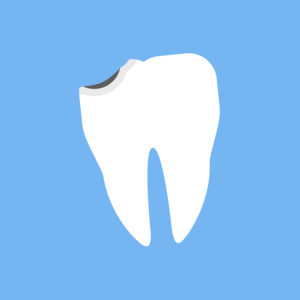16 Sep How do cavities form?
Many people think that sugar consumption is the primary reason dental decay occurs. But that is only part of the reason. Sugar and carbs from foods and beverages consumed cling to bacteria already living on teeth. During digestion this bacteria turns into acids that, if allowed to stay on teeth, can eat away at the protective enamel. In addition, food debris left behind hardens into dental plaque. The only way to eliminate plaque is a visit to the family dentist to have it removed while teeth are cleaned.
Is Dental Decay Preventable?
 There are many things that can determine the likelihood of cavities forming. Diet, daily oral care, and regular visits with the family dentist are big factors. But even the most diligent patient may experience a cavity. Some of the ways to help prevent cavities from forming include:
There are many things that can determine the likelihood of cavities forming. Diet, daily oral care, and regular visits with the family dentist are big factors. But even the most diligent patient may experience a cavity. Some of the ways to help prevent cavities from forming include:
Preventive Treatments: Your dentist offers a variety of options. Topical fluoride treatments are available as well as dental sealants. Sealants are a type of plastic coating that can be applied to the chewing surfaces of teeth never impacted by dental decay. This coating seals the pits that naturally occur on the surfaces of teeth where decay often begins.
Toothpaste: Brush twice daily with a fluoridated toothpaste.
Floss: While brushing is important, flossing daily will remove debris your toothbrush missed from between teeth. When performed correctly, flossing helps keep gum tissue invigorated.
Other Tips: Fluoride rinses, antibacterial rinses, and antiseptic rinses may be recommended by your dentist to help augment care you already provide.
Diet: A Huge Determining Factor
The daily diet should be comprised primarily of healthy grains, fruits, vegetables, dairy, and protein. And water is the ideal beverage.
Munching on crunchy fruits and veggies will help keep teeth clean; many dairy products contain the vitamins essential for healthy teeth; and good grains plus protein should round out the majority of your daily consumables.
Snacks like chips, crackers, cookies and sweets contain the sugar and carbs that contribute to plaque formation and the potential for decay. Soda and sugary beverages should be limited.
Daily care should involve brushing a minimum of two minutes twice each day with a fluoridated toothpaste; flossing daily; and visiting the family dentist every six months (or as recommended) for cleaning and a dental exam. If a cavity should occur, early detection will allow for a much easier repair.


